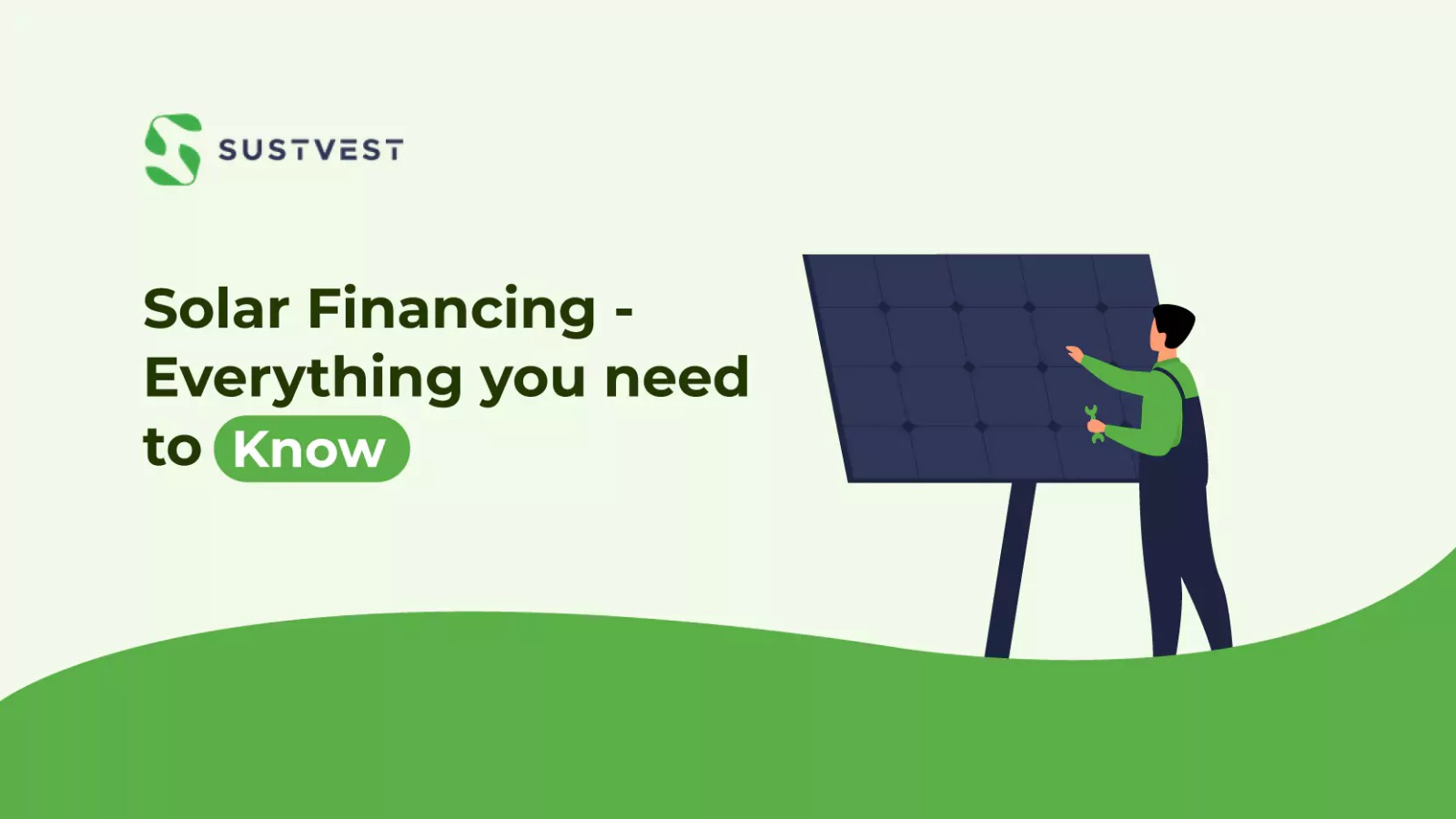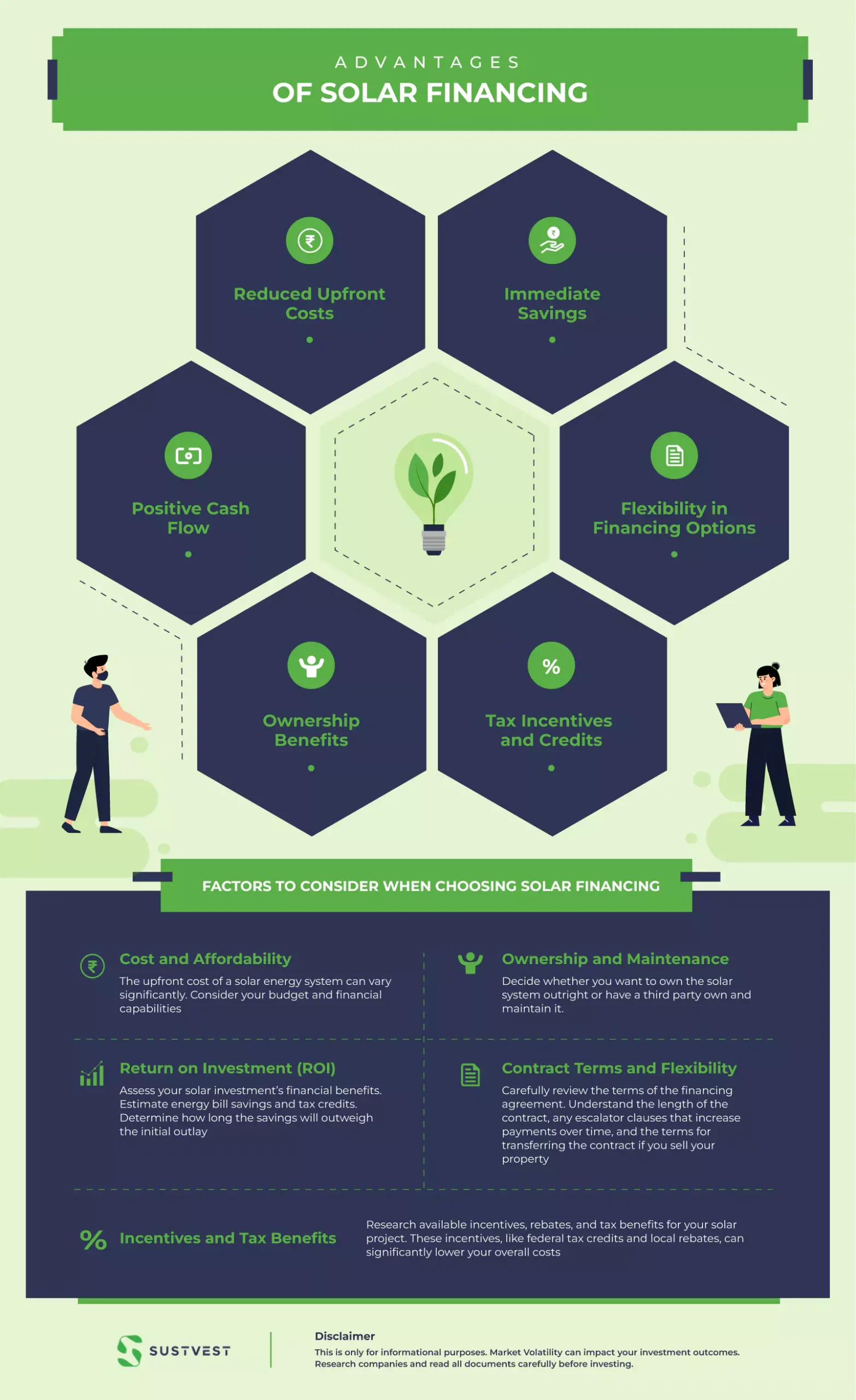Ever dreamt of harnessing the sun’s power for your home or business but got sticker shock from the upfront costs? You’re not alone.
The world of solar financing is here to bridge that gap. Instead of hefty immediate expenses, imagine breaking them down into manageable bits, all while soaking up the sun’s energy and reaping the rewards on your electricity bills.
It’s like having your solar cake and eating it too! In this guide, we’re taking the mystery out of financing those gleaming solar panels, making the journey from thought to reality smoother than ever.
Ready to turn that solar dream into a well-financed reality?
Let’s shine a light on the way forward!

What is Solar Financing?
Solar financing refers to the various methods individuals can use to make solar energy systems more affordable. Despite the benefits of solar power, the initial installation cost can be a barrier.
Solar financing options like loans, leases, and power purchase agreements (PPAs) help overcome this hurdle by allowing homeowners and businesses to spread out the expense over time. This makes solar energy accessible to a broader audience and contributes to reduced energy bills and environmental impact.
Several types of solar energy financing options are available in India to make solar energy systems more accessible. These include:
- Solar Loans: Obtaining loans to cover upfront installation costs.
- Power Purchase Agreements (PPAs): Third-party installation with energy purchase at a fixed rate.
- Solar Leases: Renting solar systems with regular lease payments.
- Subsidies and Incentives: Government offers financial benefits to reduce costs.
- Green Loans: Specialized loans for eco-friendly projects like solar.
- Crowdfunding: Collective funding for community solar projects.
- On-Bill Financing: System cost is added to the electricity bill at manageable rates.
- Vendor Financing: Installation companies offer their own financing plans.
Advantages of Solar Financing
Solar financing offers several advantages that make transitioning to solar energy more accessible and financially viable for individuals, businesses, and communities.
Some key advantages include:
1. Reduced Upfront Costs
Solar financing reduces the initial financial burden of installing solar panels by spreading costs over time. Unlike upfront purchases, options like solar loans and leases make solar energy accessible with minimal upfront expenses.
This enables individuals and businesses to enjoy the benefits of solar power, such as reduced energy bills and environmental impact, without the need for a large upfront investment.
2. Immediate Savings
Solar financing leads to immediate savings by enabling you to generate your own electricity, reducing reliance on the grid.
As your solar panels produce power, you consume less energy from the utility, resulting in lower electricity bills from day one.
These savings help offset the monthly payments for your financing option, making the transition to solar financially advantageous from the start.
3. Positive Cash Flow
Solar financing, such as leases and Power Purchase Agreements (PPAs), can lead to immediate positive financial outcomes.
Through these options, monthly payments are often lower than previous electricity bills, resulting in immediate cash flow benefits.
This arrangement enables you to enjoy the cost savings generated by solar energy from the start, potentially exceeding the financing payments.
This advantageous cash flow dynamic enhances the appeal of solar energy adoption and supports your financial well-being.
4. Ownership Benefits
When you choose solar loans or outright purchases, the solar system becomes your property, offering long-term advantages:
- Financial Gain: You reap the benefits of energy savings, potentially earning back your investment over time.
- Property Value: Solar panels can increase your property’s value, making it more attractive to potential buyers.
- Control: You have full control over the system’s maintenance and any potential upgrades.
- Return on Investment: The energy generated can lead to income through surplus power fed back into the grid.
- Long-Term Savings: Ownership ensures that you benefit from decades of free, renewable energy.
5. Tax Incentives and Credits
Tax incentives and credits like the Section 80-IA of the Income Tax Act, 1961 significantly cut solar installation costs.
With the ITC, you can deduct a portion of your solar system’s expenses from your taxes. This results in a direct reduction in your overall investment, making solar financing more attractive and economically feasible.
This financial benefit encourages sustainable energy adoption, facilitating a greener future while also boosting your financial savings in the process.
Beyond these incentives, Understanding Solar Power Taxes: Exemptions and Generation Levies Explained will offer you a comprehensive understanding of solar-related tax nuances
6. Flexibility in Financing Options
Solar financing offers flexibility with options like loans, leases, and PPAs. You can find a suitable arrangement regardless of your financial situation or preference.
Solar loans enable ownership with manageable payments, while leases and PPAs reduce upfront costs. Leases let you use the system without ownership, and PPAs involve buying the energy produced.
These choices cater to diverse needs, making solar energy accessible to a wider audience.
Disadvantages of Solar Financing
While solar financing offers many benefits, there are also several disadvantages to consider before making a decision. These include:
- Long Payback Periods: The initial investment for solar systems can take years to pay off, delaying the realization of substantial savings fully.
- Credit Requirements: Some financing options require a good credit score, potentially excluding individuals with lower credit ratings.
- Limited Ownership Benefits: Lease and PPA agreements can limit ownership advantages, such as tax incentives and increased property value.
- Contractual Obligations: Lease and PPA agreements come with binding contracts, restricting flexibility for system modifications or relocation.
- Interest and Fees: Solar loans may accrue interest and fees, increasing the overall cost of the system over time.
Factors to Consider When Choosing Solar Financing
Choosing the right solar financing option is a critical decision that involves several important factors.
Here are key considerations to keep in mind when evaluating your solar financing choices:
1. Cost and Affordability
The upfront cost of a solar energy system can vary significantly. Consider your budget and financial capabilities. Assess whether you can afford to buy the system outright or need financing to spread the expense.
Compare loans, leases, PPAs, and solar-specific loans to find the best fit for your finances.
2. Return on Investment (ROI)
Assess your solar investment’s financial benefits. Estimate energy bill savings and tax credits. Determine how long the savings will outweigh the initial outlay. A shorter payback period generally indicates a better ROI.
Keep in mind that factors like local electricity rates, solar system efficiency, and financing terms can impact your ROI.
While calculating ROI is pivotal, it’s also beneficial to grasp What is ROIC (Return on Invested Capital)? as a deeper insight into investments.
3. Ownership and Maintenance
Decide whether you want to own the solar system outright or have a third party own and maintain it.
If you prefer ownership, options like loans or cash purchases allow you to take advantage of the long-term benefits of solar energy, such as increased property value and decades of free electricity.
Leases and PPAs, on the other hand, often involve a third party owning and maintaining the system, which can alleviate maintenance responsibilities but may yield fewer financial benefits over the long term.
4. Contract Terms and Flexibility
Carefully review the terms of the financing agreement. Understand the length of the contract, any escalator clauses that increase payments over time, and the terms for transferring the contract if you sell your property.
For leases and PPAs, consider whether the terms align with your expected ownership duration. Ensure the agreement provides the flexibility you need in case your circumstances change.
5. Incentives and Tax Benefits
Research available incentives, rebates, and tax benefits for your solar project. These incentives, like federal tax credits and local rebates, can significantly lower your overall costs.
Ensure you understand the eligibility criteria and application processes for these incentives, as they can greatly impact the financial feasibility of your solar investment.

FAQs-Solar Financing – Everything You Need To Know
How does a solar lease work?
In a solar lease, a homeowner or business rents a solar energy system from a provider, paying a fixed monthly fee for the electricity generated without owning the equipment.
What is a solar Power Purchase Agreement (PPA)?
A solar PPA involves a third party installing and maintaining solar panels on a property, and the property owner purchases the generated electricity at a predetermined rate, often lower than utility rates.
What are solar incentives?
Solar incentives are financial benefits offered by governments, utilities, or organizations to encourage the adoption of solar energy, such as tax credits, rebates, grants, and renewable energy certificates (RECs).
Can I get a solar loan with bad credit?
Some lenders offer solar loans to individuals with less-than-perfect credit, but terms and interest rates might vary. Exploring options and improving credit can help secure better loan terms.
Conclusion
Understanding solar financing options becomes crucial as we journey toward a more sustainable future. Choosing the correct funding type can help the environment and lower energy expenses.
Remember, there’s a solar financing solution for homeowners and business owners. Explore your options today and take a step towards a brighter tomorrow.
As we harness the sun’s power, let’s also understand Why Renewable Energy Is Important For Sustainable Development? Every solar panel contributes to a greener planet.
And for those looking to invest sustainably, consider exploring SustVest, a platform dedicated to environmentally conscious investment opportunities.

Founder of Sustvest
Hardik completed his B.Tech from BITS Pilani. Keeping the current global scenario, the growth of renewable energy in mind, and people looking for investment opportunities in mind he founded SustVest ( formerly, Solar Grid X ) in 2018. This venture led him to achieve the ‘Emerging Fintech Talent of the Year in MENA region ‘ in October 2019.




